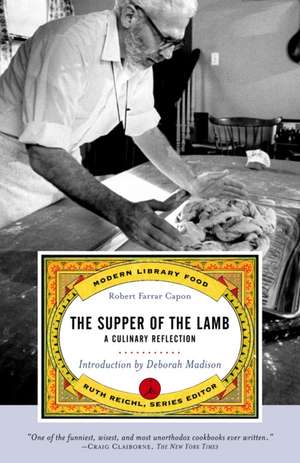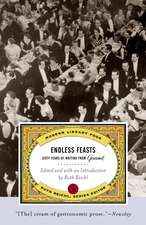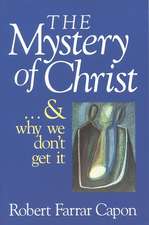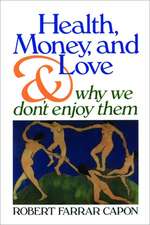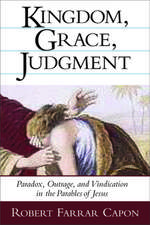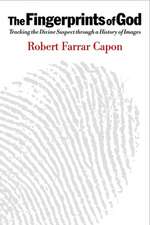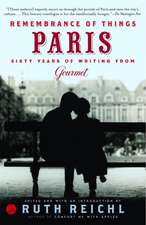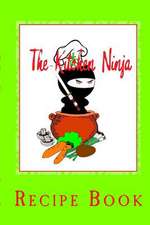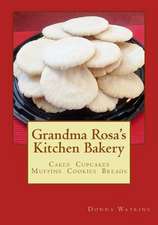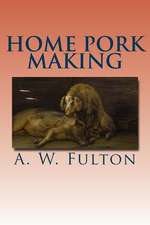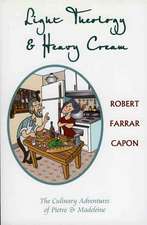The Supper of the Lamb: A Culinary Reflection: Modern Library Food
Autor Robert Farrar Capon Editat de Ruth Reichlen Limba Engleză Paperback – 30 iun 2002
| Toate formatele și edițiile | Preț | Express |
|---|---|---|
| Paperback (2) | 105.19 lei 22-36 zile | |
| Modern Library – 30 iun 2002 | 105.19 lei 22-36 zile | |
| HarperCollins Publishers – 4 feb 1979 | 127.82 lei 43-57 zile |
Preț: 105.19 lei
Nou
Puncte Express: 158
Preț estimativ în valută:
20.13€ • 21.88$ • 16.92£
20.13€ • 21.88$ • 16.92£
Carte disponibilă
Livrare economică 31 martie-14 aprilie
Preluare comenzi: 021 569.72.76
Specificații
ISBN-13: 9780375760563
ISBN-10: 0375760563
Pagini: 320
Dimensiuni: 132 x 205 x 17 mm
Greutate: 0.23 kg
Editura: Modern Library
Seria Modern Library Food
ISBN-10: 0375760563
Pagini: 320
Dimensiuni: 132 x 205 x 17 mm
Greutate: 0.23 kg
Editura: Modern Library
Seria Modern Library Food
Notă biografică
Robert Farrar Capon is the author of numerous books on theology, cooking, and family life. His works include Between Noon and Three; Kingdom, Grace, Judgment; and Genesis, the Movie. Capon lives on Shelter Island, New York.
Extras
I read the first recipe, an appetizer made of lemon gelatin poured into a banana skin filled with little banana balls. “When opened, the banana looks like a mammoth yellow pea pod,” I concluded triumphantly. “Can you imagine a world in which that sounds like a good idea?” I could. I could put myself in the dining room with its fussy papered walls and hot air. I could see the maid carrying in this masterpiece, hear the exclamations of pleasure from the tightly corseted woman of the house.
But the magic didn’t work for Mom; to her this particular doorway to history was closed. So I tried again, choosing something more exotic. “Listen to this,” I said, and began reading.
“Wild strawberries were at their peak in the adjacent forests at this particular moment, and we bought baskets of them promiscuously from the picturesque old denizens of the woods who picked them in the early dawn and hawked them from door to door. The pastry was hot and crisp and the whole thing was permeated with a mysterious perfume. Accompanied by a cool Vouvray, these wild strawberry tarts brought an indescribable sense of well-being."
Anything?” I asked. She shook her head.
But the magic didn’t work for Mom; to her this particular doorway to history was closed. So I tried again, choosing something more exotic. “Listen to this,” I said, and began reading.
“Wild strawberries were at their peak in the adjacent forests at this particular moment, and we bought baskets of them promiscuously from the picturesque old denizens of the woods who picked them in the early dawn and hawked them from door to door. The pastry was hot and crisp and the whole thing was permeated with a mysterious perfume. Accompanied by a cool Vouvray, these wild strawberry tarts brought an indescribable sense of well-being."
Anything?” I asked. She shook her head.
Recenzii
“One of the funniest, wisest, and most unorthodox cookbooks ever written.”
—Craig Claiborne, The New York Times
“The Supper of the Lamb is a rare, distilling nectar, albeit fizzy with bubbles of humor and wit...it is fully capable of rescuing us from the dangers of mediocrity daily foisted upon us by the too-fast pace of our lives.”
—From the Introduction by Deborah Madison
“The Supper of the Lamb is as awesomely funny, wise, beautiful, moving, preposterous a book as this reviewer has come across for years....It is a love letter to a world that ‘will always be more delicious
than it is useful.’”
—The New York Times Book Review
—Craig Claiborne, The New York Times
“The Supper of the Lamb is a rare, distilling nectar, albeit fizzy with bubbles of humor and wit...it is fully capable of rescuing us from the dangers of mediocrity daily foisted upon us by the too-fast pace of our lives.”
—From the Introduction by Deborah Madison
“The Supper of the Lamb is as awesomely funny, wise, beautiful, moving, preposterous a book as this reviewer has come across for years....It is a love letter to a world that ‘will always be more delicious
than it is useful.’”
—The New York Times Book Review
